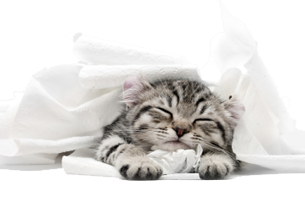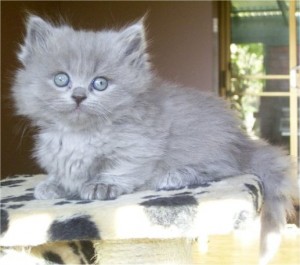Snotty-nosed and snuffly cats are difficult to live with. Their owners put up with sneezes and snot all over the house, as well as snuffles and grumbles all day and half the night.
The causes of sinusitis and rhinosinusitis are also difficult for vets to diagnose accurately and even more difficult to treat effectively.
 Inflammation and infection spread rapidly from cats’ throats to adjacent structures, such as the middle ear, frontal sinuses, nose and tympanic bullae. These cavities are difficult to reach with medical or surgical treatments.
Inflammation and infection spread rapidly from cats’ throats to adjacent structures, such as the middle ear, frontal sinuses, nose and tympanic bullae. These cavities are difficult to reach with medical or surgical treatments.
Feline mucus is also thicker than human mucus and medication has a hard time penetrating the mucus to get to the offending microbes.
Feline Herpesvirus is the most common initiating cause of chronic rhinitis and rhinosinusitis. It causes chronic airway inflammation and swelling, destroys the normal lining of the nasal cavity and upsets the normal mucus layers. The nasal cavity cannot remove foreign particles or the abnormal mucus and the sinuses become blocked. Bacteria leap in and set up infections making the situation even worse.
Drugs to reduce the mucus and the swelling in the sinuses help a bit. We treat the bacterial infection with antibiotics but are still left with Herpesvirus and all the damage it does. Herpesvirus sinusitis soon flares up into full blown bacterial sinusitis again. Some cats respond well to antiviral drugs but others keep getting intermittent sinusitis.
Nastier causes of similar signs are Cryptococcosis, a fungal disease, and cancer, commonly lymphoma, adenocarcinoma and squamous cell carcinoma. These are difficult to distinguish on X-ray but CT or MRI are very helpful, if they are available. A biopsy clears up any doubts. A blood test is available for Cryptococcosis.
Bad teeth and infected tooth roots sometimes make cats snuffly. A dental inspection and X-ray under general anaesthetic allow targeted and successful treatment.
Occasionally a cat breathes in a grass seed or other foreign body. Usually nasal discharge is from one side only and there is some bleeding.


